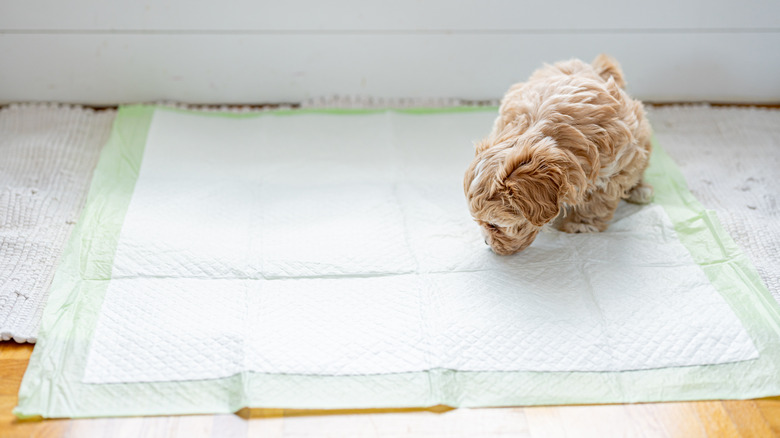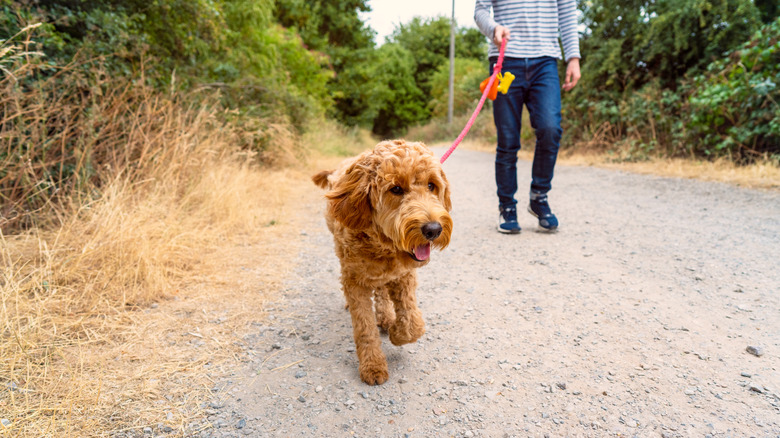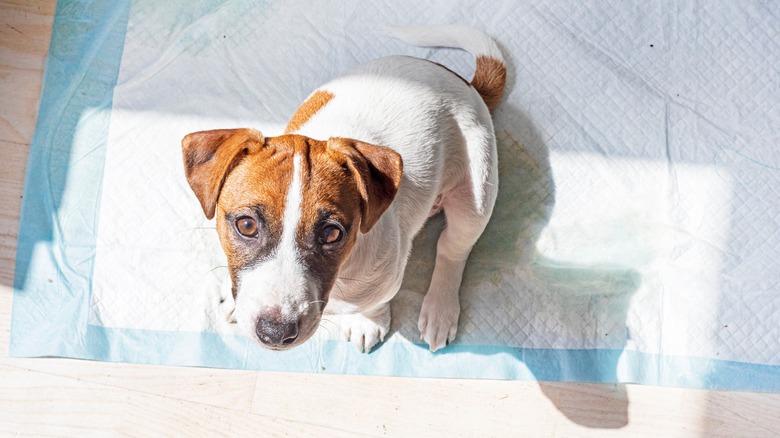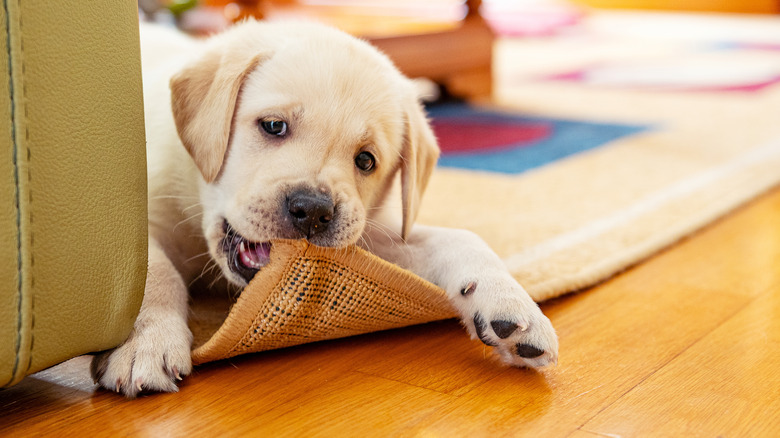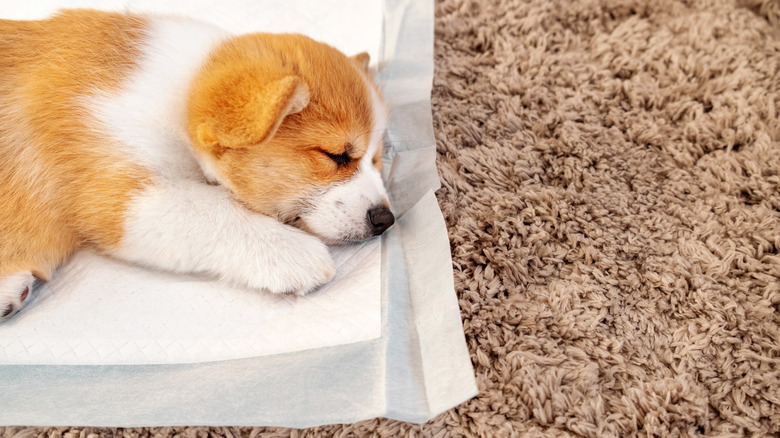Hidden Downsides Of Using Puppy Pads To Potty Train Your Dog
We may receive a commission on purchases made from links.
Puppy pads are one of the most popular ways to potty train a dog and it's easy to see why. For pet parents who live in an apartment building and don't want to constantly trek up and down stairs to take their dog outside, they're incredibly convenient. They're also useful for pups who must remain inside while their parents are out during the day for work. And, despite the name, puppy pads don't have to be used with only puppies, as they can also be beneficial for senior dogs who are incontinent.
While these mats have their pros, if you're considering using puppy potty training pads as the primary way to housebreak your dog, you should be aware that they also have some downsides. If your goal is to completely housebreak your dog to use the bathroom outdoors, encouraging them to use puppy pads can create challenges in the training process. On top of that, puppy pads can be costly if used for a long time, and can be harmful to both puppies and the earth.
They can create challenges with outdoor potty training
One of the biggest drawbacks of using puppy pads is that it can create hiccups in the potty training process. Puppy pads teach your dog to pee in a particular spot, so when you do start to take them outside, it can cause them to feel confused about where they are supposed to go.
The other concern with puppy pads is that it could condition your dog to view other indoor surfaces as a bathroom; which can become problematic if and when you decide to remove the pee pads for good. As dog trainer Brett Reynolds told Rover, "since the pad itself mostly serves as a visual cue for where he or she should eliminate, some dogs will look for any contrasting surface in the absence of a potty pad." This means that even if you take the pee pads away in hopes your pup will go outside, they might instead start going on rugs and other areas they believe they are supposed to use.
If you plan on using puppy pads, consider using them solely until you are ready to fully transition your puppy to using the bathroom outside. When the time comes, you can begin to move their pads closer to the door where they will be going out to potty, and eventually take them outside instead of having them go on the pad.
They're wasteful and expensive
Part of the convenience of using puppy pads is that you can simply throw them out after your dog uses them. However, this also means they aren't exactly environmentally friendly. Many puppy pads contain non-biodegradable plastics for absorbency, which means they cannot be recycled.
These materials can take years to break down, causing the used puppy pads to sit in landfills for a long time. However, if you must use pee pads, consider switching to reusable ones that can help cut back on waste. Sunheir offers a two-pack of washable pee pads on Amazon for under $30 at the time of writing. For an even more affordable and environmentally-friendly option, you can swap out your pad for regular newspaper. However, be aware that newspaper isn't as absorbent as regular pee pads, so there could be some leakage you'll need to clean up.
Puppy potty pads might seem like an affordable training option, with a typical package of 100 pads costing between $15 and $40. However, if your dog becomes reliant on them, the cost can start to add up over time. In the long run, training them to go outside will most likely be better for your wallet, as well as more beneficial for your pooch.
Your puppy could accidentally ingest pieces of the puppy pad
Puppies are playful, curious creatures, that love to explore, play, and chew on anything and everything. This innate habit can lead to potential problems when it comes to puppy pee pads. There's a chance your curious puppy could end up ripping them to shreds and even eating some of the pieces. This is more likely to happen if your pup is bored, so be sure you are giving them plenty of exercise as well as mental stimulation to prevent destructive behaviors. Scented pads can also entice your puppy to view it as a toy, so it may be best to avoid options that contain any fragrance. Plus, in some cases, those synthetic fragrances can be irritating to your dog and trigger allergies.
If your puppy happens to ingest pieces of a puppy pad, it's important to get them checked out at the vet as soon as you can to make sure they don't have an intestinal blockage. Signs of an intestinal blockage include lethargy, vomiting, diarrhea, and loss of appetite. If your puppy is notorious for chewing on everything, puppy pads are probably best avoided to prevent any complications from occurring.
They prevent early socialization
Although using a puppy pad guarantees your dog flexibility and safety, if your dog only goes to the bathroom inside, you run the risk of them becoming nervous or uncomfortable to relieve themselves outside or in front of other dogs. Puppy pads also allow dogs to be left to their own devices and pee on their own schedule, which can become problematic when it's time to train them to use the bathroom at a certain time.
If your dog has become dependent on the pads, you may find they refuse to use the bathroom while on walks. This is why it's important to start outdoor potty training while they are still young to help them learn a routine and become socialized.
Puppy pads can become unsanitary
Along with the other reasons listed, one of the most notable drawbacks of using puppy pads is their filthy nature. Even if your puppy knows to relieve themself on the pad, there's always a chance they could be slightly off with their aim and leak on the floor, which can quickly stink up your home. There's also the possibility of your pup viewing the pee pad as a bed or place to roll around. This can quickly become unsanitary as it creates the potential for waste to get on their fur that can spread to other surfaces in your home.
If you plan to use puppy pads, be sure to change them out frequently to reduce any potential odors. Make sure to sanitize any areas where a pee pad may have leaked or where any waste may have gotten on the floor. Always wash your hands after handling a used pee pad to prevent germs from spreading around your home.
